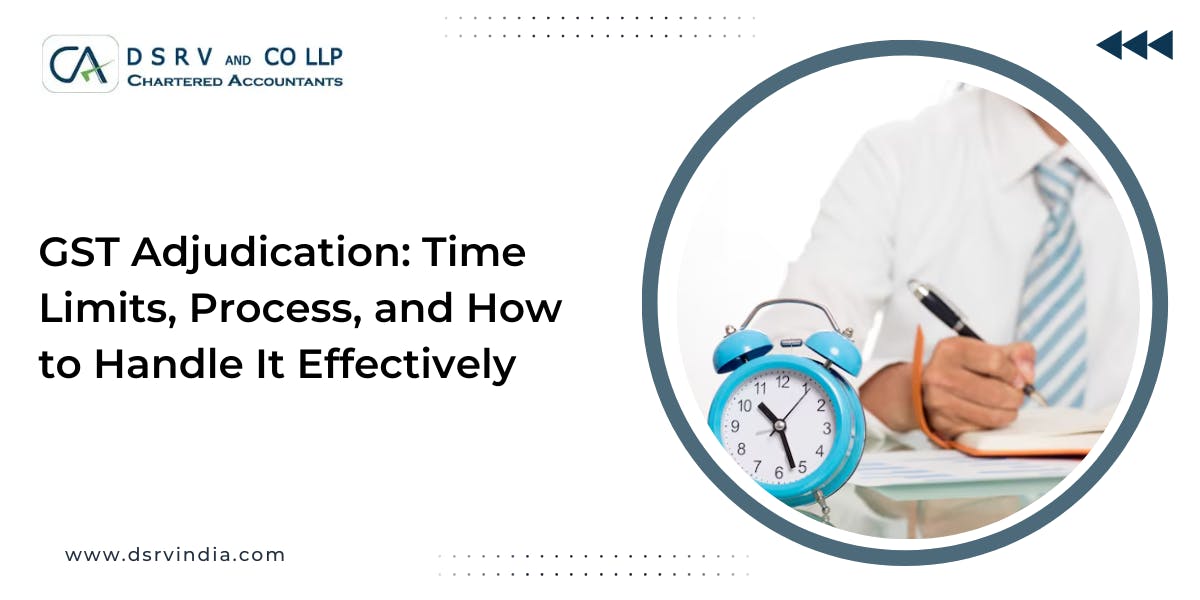GST Adjudication: Time Limits, Process, and How to Handle It Effectively
Facing GST adjudication? Learn the process, time limits, authorities involved, and how to represent your case during adjudication under GST with professional guidance.
Facing GST adjudication? Learn the process, time limits, authorities involved, and how to represent your case during adjudication under GST with professional guidance.

Ever opened a GST notice and felt your heart sink? You’re not the only one. Every year, thousands of businesses—small shops, growing startups, even big names—receive these letters. And most of them lead to a process called GST adjudication.
Sounds heavy, right? But here’s the simple truth: adjudication just means the tax department thinks there’s a mistake in your GST filings and wants you to explain. It’s their way of saying, “Show us your side of the story.” After that, the officer decides whether extra tax, interest, or a penalty is due.
Here’s where it gets serious. If you reply casually or miss a deadline, you might end up with blocked ITC, heavy penalties, or a case that drags on for months. But if your reply is clear, backed with documents, and filed on time, the outcome can be very different—you could save money and close the matter quickly.
That’s why many business owners don’t take chances. They get help from a trusted GST consultant in Gurgaon who deals with these notices every day. With the right guidance, you don’t have to worry about missing a step, misreading a notice, or losing your case to technical errors. Instead, you get peace of mind knowing an expert is handling things.
Recommended: 11 Key Points You Should Know for Non-Residents Filing Tax Returns in India

Adjudication under GST is the department’s way of deciding disputes. Think of it as the tax officer playing the role of a judge in your GST matter. It usually starts with a show cause notice (SCN).
This notice might say:
The officer then hears your side, reviews the documents, and passes an order. That order decides whether you owe anything extra.
For startups and smaller firms, a lot of these issues can be avoided early with proper GST registration in Gurgaon and timely compliance. But if a notice comes your way, adjudication is how it gets resolved.
Read More: Understanding and Resolving Inflated GST Tax Demands in 2025
Not every case is the same. Under GST, adjudication can mean:
Big corporates usually take help from chartered accountant firms in Gurgaon to manage such cases, especially when large sums are involved.

Why does the GST department start adjudication? Some common reasons are:
Even smaller businesses can get caught up in these. That’s when a reliable CA in Gurgaon can step in, explain the law, and represent your side properly.
Adjudication may sound complex, but it’s basically a step-by-step process:

Representation is everything. A well-prepared defense can save you lakhs in penalties. Here’s how to do it right:
Read the SCN carefully. Check which sections of the GST Act are mentioned and what the officer is alleging.
Keep everything ready—GST returns, invoices, ledgers, contracts, reconciliation statements.
Your reply should explain clearly, using facts, GST law, and even case law if needed. Keep it professional and error-free.
Be clear, stay calm, and avoid contradictions. Stick to compliance and evidence.
Sometimes officers ask for clarifications after the hearing. Reply promptly to keep things moving.
Here’s a checklist of what you may need:
Having these organized makes your case stronger and shows professionalism.
Adjudication begins the moment a show cause notice is issued. Notices often come after:
So, if you get an SCN, it means the department believes something is off and wants your explanation.
The GST law sets deadlines for when orders must be passed:
If they miss these deadlines, the case becomes time-barred.
While adjudication is manageable, prevention is always better. Some practices can help businesses avoid most disputes:
Didn’t get a favorable order? Don’t worry—you still have options:
Not taking adjudication seriously can be costly:
Adjudication under GST may sound intimidating, but at its core, it’s simply a process to resolve disputes. It starts with a notice and ends with an order. The key lies in how you represent yourself.
Think of adjudication as your chance to explain your side. If you prepare well, keep documents ready, and act on time, you can avoid penalties and protect your business.
And remember—you don’t have to go through it alone. Many businesses choose professional support because a GST expert knows how to draft replies, handle hearings, and speak the language of tax officers. With the right help, adjudication becomes less stressful and much more manageable.
At DSRV India, we help businesses handle GST adjudication from start to finish. From drafting replies to attending hearings, we make sure your case is represented professionally and your rights are protected.
POEM Tax India: Foreign Subsidiary Resident Triggers. Understand POEM rules in India for foreign companies. Determine tax triggers for a company in India.
Understand withholding tax on cross-border payments in India. This guide covers TDS, DTAA treaty benefits, tax rates, deduction, compliance.
Inter-company loans in India: navigate tax implications, FEMA rules, and Companies Act compliance. Vital for group companies & foreign investment.
